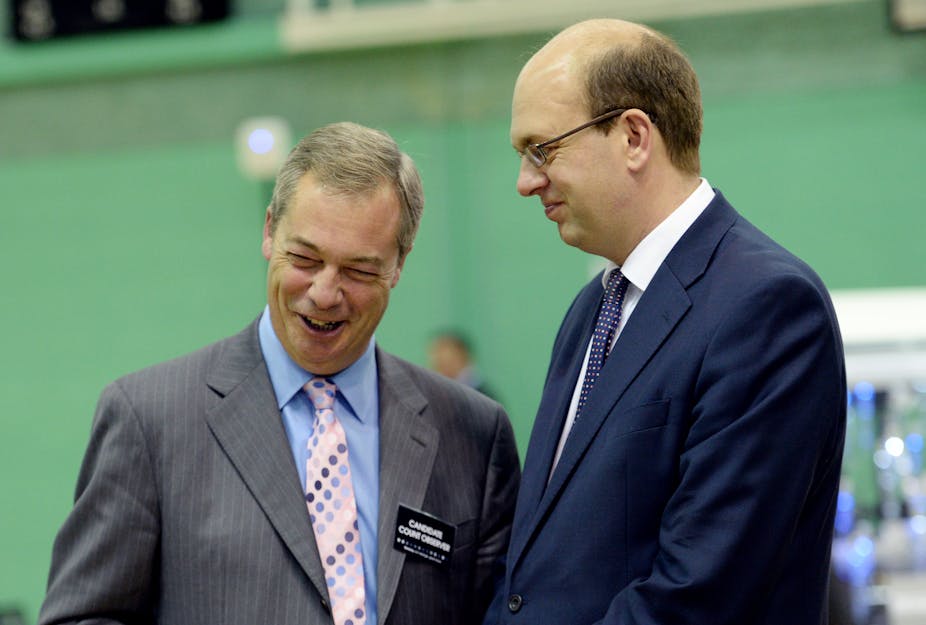A UKIP victory was far from assured at the beginning of the Rochester and Strood by-election campaign, but by polling day it was as near to a political certainty as it’s possible to get in these volatile times. For pundits, the trickiest task was to guess which of the so-called main parties would come off worst.
Mark Reckless, who defected from the Conservatives to UKIP earlier this year won the seat for his new party by 2,920 votes, beating his old party into second place. But it was the race to seize the wooden spoon that provided the biggest surprise of the night.
For most of the campaign, the Conservatives looked sure to suffer the most. As promised, they campaigned hard in Rochester and Strood, with the prime minister leading the way. Their efforts had no noticeable effect on the opinion polls – except, perhaps, to increase UKIP’s lead. By contrast, Labour and the Liberal Democrats did their best to pretend that the by-election wasn’t happening.
In the end, although the result is undoubtedly bad for the Conservatives and for David Cameron personally, they have fared better than their two traditional rivals. Keeping UKIP’s margin of victory to less than ten percentage points means that Rochester and Strood can be filed under “hugely embarrassing” rather than “completely catastrophic”.
Analysts say that UKIP might have identified 270 seats that are more winnable than Rochester and Strood, but there are unlikely to be 270 candidates at the next general election who are former Conservative MPs fighting their old constituencies under the UKIP label.
On balance, the Rochester and Strood result makes further Conservative defections less likely. David Cameron and his allies can therefore take some comfort from national opinion polls which suggest that the general election is still up for grabs.
For Labour and the Liberal Democrats there is no such consolation. The Lib Dems, once the most formidable of by-election combatants, have crowned a run of miserable results with a return of less than 1% of the vote at Rochester and Strood.
It was predictable that they might leak support to Labour, but this by-election confirms that the Greens are soaking up plenty of defectors and some erstwhile Lib Dems are even voting for UKIP. The party’s only realistic hope is that the incumbency effect, which has helped UKIP at Clacton and now at Rochester and Strood, will allow the Lib Dems to survive as a significant parliamentary force after May 2015.
Labour pain
It seems scarcely credible that any party could out-do the Lib Dem disaster – but somehow Labour managed it.

Much attention has been focused on Labour MP Emily Thornbury’s social media gaffe, which saw her resign from the Labour front bench for tweeting a picture of a home in Rochester decorated with English flags.
But this was only the clinching moment in a campaign which surely trumps the 1983 Bermondsey by-election among Labour’s darkest days.
Combined with surveys which emphasise UKIP’s appeal to disgruntled Labour voters throughout England, the ever-increasing SNP surge in Scotland presents the party’s strategists with a hideous nightmare. Labour’s chances of winning an outright majority at the next election – or even of forming part of a coalition – now seem to depend on an heroic effort from core supporters in its heartlands. But Labour has apparently been doing its best to shed such traditional supporters since the advent of Blairism in 1994. Indeed, UKIP will no doubt view these people as precisely the ones who are most likely to clamber aboard Farage’s bandwagon.
Apart from triggering Thornbury’s resignation, Twitter has supplied some fascinating insights into this campaign. In terms of attracting new followers, it was the Green Party rather than UKIP that fared best, having boosted its following nationally to more than 82,000 followers. The Greens attracted 1,692 votes. UKIP ran an energetic social media campaign but still trails the Greens with just over 72,000 Twitter followers.
For his part, David Cameron Tweeted about all of his unavailing visits to the Medway, while the Conservative Party itself maintained a studious silence. Cameron might be on the ropes, but this campaign proves to any doubters that he will keep throwing punches to the end. This unquenchable pugnacity might just be the most lasting impression left by the contest for Rochester and Strood, on Cameron’s party and the public as a whole. If so, the Prime Minister might end up seeing a predicted disaster as something like a blessing in a very heavy disguise.

